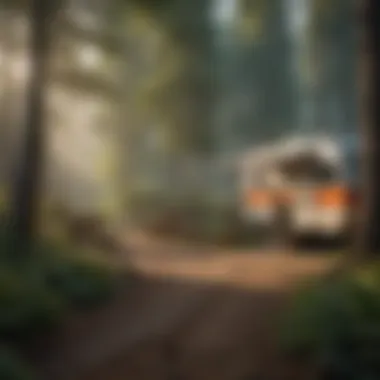Becoming a Campground Host: A Comprehensive Guide


Intro
For those who find solace in the great outdoors, becoming a campground host is like hitting the jackpot. It's not just a chance to enjoy nature every day; it’s a unique opportunity to serve as a bridge between visitors and the wilderness. Campground hosts play a pivotal role in guiding, educating, and enhancing the overall experience for those exploring the beauty of forests and parks. This guide explores the responsibilities, skills, and impacts of the host role, providing a roadmap for anyone considering this rewarding path.
Understanding Woodland Ecosystems
Importance of Biodiversity in Forests
Woodland ecosystems are bustling with life. From towering trees to the smallest fungi, every entity contributes to the intricate web of biodiversity. This rich tapestry not only enhances aesthetic pleasure, but it also plays significant roles in ecosystem services. Biodiversity refers to the variety of life found in a habitat. Each organism has its place, from the tiniest ants to the largest predators.
The significance of biodiversity in forests can’t be overstated. A diverse ecosystem creates resilience against pests, diseases, and environmental changes. For example, imagine a forest where only one tree species dominates. That's a setup for disaster if a pest comes along that targets those trees. On the other hand, a diverse forest offers a buffet of possibilities for plants and animals, allowing nature to adapt and thrive.
Role of Forests in Climate Regulation
Forests, particularly in the context of climate regulation, act like Earth's lungs. They absorb carbon dioxide and release oxygen, a process crucial for maintaining a balanced atmosphere. This exchange is vital for ensuring that air quality remains healthy for all life. Moreover, forests play a role in moderating temperatures; they provide shade and shelter, creating microclimates that benefit various species.
When a campground host is familiar with these functions of forests, they can educate visitors about the importance of tree conservation and responsible outdoor practices, potentially leading to a greater appreciation of the environment.
"Understanding the depth of ecological interdependence can transform the way we experience nature."
Sustainable Forestry Practices
Principles of Sustainable Forestry
Sustainable forestry isn't merely a trend; it's a necessity in today's world. This practice revolves around managing forests in a way that meets current ecological, social, and economic needs without compromising these same needs for future generations. Key principles include:
- Maintaining Forest Health: Prioritizing the well-being of flora and fauna.
- Responsible Harvesting: Ensuring that tree extraction is done carefully, with minimal impact on the ecosystem.
- Community Involvement: Engaging local communities in management decisions fosters stewardship and respect for the land.
Case Studies of Successful Implementations
Consider the Jackson Hole Community Forestry Program, which serves as a model for sustainable practices. By balancing ecological health with community needs, they've worked collaboratively to manage forest resources, enhancing outcomes for all involved. Programs like these showcase how sustainability can harmoniously exist alongside economic growth.
Woodland Stewardship Techniques
Forest Management Plans
Crafting a forest management plan is essential for any aspiring host to understand their role. These plans are comprehensive blueprints for maintaining and enhancing forest health. They often cover aspects like tree species composition, management activities, and long-term goals. Implementing such a plan allows hosts to contribute positively to the areas they oversee, ensuring a flourishing environment.
Conservation Strategies
In parallel, conservation strategies are vital for maintaining biodiversity and ecological balance. These strategies can range from protecting endangered species within the forest to creating buffers around sensitive areas. By engaging in active conservation efforts, hosts can leave a lasting impact, encouraging the next generation to appreciate and protect these natural treasures.
Understanding the Role of a Campground Host
Camping remains a refuge from our speedy lives, where people seek connection with nature. Enter the campground host, a crucial figure in this scene. It's not merely a job; it's a commitment to creating an inviting and safe environment. Understanding the role of a campground host is vital for both aspiring hosts and the camping community. It constructs a bridge between nature and people, enhancing the camping experience.
Definition and Purpose
A campground host is a volunteer or paid position. This person manages the activities at a campground. Their main aim? To ensure that visitors have a pleasant and safe stay. Equipped with a plethora of knowledge about the area, hosts are often the first point of contact for campers. Their duties stretch beyond administration—they foster a welcoming atmosphere, encourage local ecology appreciation, and share their knowledge about the outdoors.
Key Responsibilities
The responsibilities of a campground host vary widely. Below are some of the core duties:
- Welcoming Guests: First impressions count. A warm greeting sets the tone for the campers’ experience.
- Guest Management: Ensuring all campers understand the rules and regulations is crucial for safety and harmony in the shared space.
- Facility Maintenance: Hosts often check restrooms, fire pits, and trails, ensuring cleanliness and usability.
- Information Source: Being knowledgeable about area attractions, trails, and safety concerns positions hosts as valuable resources for visitors.
- Conflict Resolution: Occasionally, disagreements may arise among campers. Hosts need to mediate these disputes calmly and fairly.
Each responsibility underscores the significance of hosts in enhancing the camping atmosphere, contributing positively to the community.
The Importance of Campground Hosts in Outdoor Spaces
Campground hosts serve as the heart of outdoor spaces, bridging the gap between nature and humanity. Their presence promotes a healthy camping culture.
Hosts are educators, imparting knowledge on responsible camping, wildlife interactions, and environmental stewardship. They play a pivotal role in engaging with visitors, encouraging them to respect and appreciate nature.
“The relationship campers develop with hosts tends to enhance their outdoor experience, leading to increased visitor satisfaction and repeat occupancy.”
Moreover, a well-managed campground fosters a sense of community. Campers often engage with hosts and each other, building relationships that thrive beyond the trip. This network encourages a cycle of return visitors, all drawn back by the camaraderie cultivated by hosts. In this sense, understanding the role of hosts isn’t just about practical tasks; it’s also about nurturing human connections in nature.
Through this section, it becomes clear: campground hosts are essential for a fulfilling outdoor experience. They are more than supervisors; they are ambassadors of the natural world.
Prerequisites for Becoming a Campground Host
Before setting foot into the role of a campground host, it's vital to understand the prerequisites that lay the groundwork for a rewarding experience. This section breaks down the personal qualities, physical requirements, and essential skills necessary for those considering this unique endeavor.


Personal Qualities Needed
To thrive as a campground host, one needs to possess a blend of personal qualities that go beyond merely enjoying the outdoors. First and foremost, patience is essential. Campers come with diverse backgrounds and expectations, and a host often encounters various personalities. The ability to stay calm and composed, even when faced with challenges, helps in fostering a welcoming atmosphere.
Additionally, communication skills cannot be overstated. A good host must convey information clearly and effectively, whether it’s about campground rules or directions to nearby trails. It's also crucial to have a genuine enthusiasm for nature and outdoor activities. This passion can be contagious and may motivate campers to engage more deeply with the environment.
Lastly, adaptability is key. Weather can change faster than one can say "campfire," and being able to adjust plans and maintain a positive attitude is invaluable.
Physical Requirements and Considerations
Being a campground host is not just a walk in the park—it can involve engaging in physical activities that demand a certain level of stamina and fitness. Lifting heavy objects, such as firewood or maintenance equipment, is a common aspect of the job. Comfortable footwear and attire suited for outdoor tasks are necessary.
Moreover, hosts may need to traverse uneven terrain or hike short distances to check on facilities or respond to camper inquiries. Consequently, a good level of physical fitness is important. Those with mobility issues might face difficulties in this role, thus making it essential to assess oneself realistically.
Weather conditions can also pose challenges. During the hot summer months, staying hydrated and protected from sun exposure is imperative. Conversely, winter months can be harsh, and knowledge of how to keep warm and safe in cold weather is vital.
Essential Skills and Knowledge
Success as a campground host hinges not just on what you bring in terms of attitude and fitness but also on specific skills and knowledge pertinent to the role. Basic first aid knowledge is often not just recommended but necessary. Knowing how to handle minor injuries or health issues can make a significant difference in emergencies.
Familiarity with local flora and fauna enriches the hosting experience. When campers inquire about certain plants or animals, a knowledgeable host can provide accurate information or suggest safe interactions. Having a grasp of Park Service regulations is also crucial for ensuring compliance and effectively addressing queries or concerns.
Additionally, basic maintenance and repair skills can be quite beneficial. Being able to troubleshoot a broken picnic table or a malfunctioning faucet demonstrates resourcefulness and can save time while maintaining campground operations.
In summary, the prerequisites for becoming a campground host encompass a range of personal qualities, physical readiness, and essential skills that contribute to the overall effectiveness and enjoyment of the role. Embracing these elements not only enhances the host's experience but also significantly impacts the campers and the environment.
Exploring the Application Process
When embarking on the journey to become a campground host, understanding the application process is fundamental. This stage acts as the gateway to this rewarding experience, laying the groundwork for what lies ahead. Not only does a well-thought-out application set you apart, but it also enhances your chances of securing a position. Let's delve into the specifics.
Researching Opportunities
The first step in this quest involves thorough research. Identifying campgrounds or organizations that are seeking hosts is essential. Many state parks, national forests, and private campgrounds post opportunities on their websites or social media platforms. It's worth checking out online forums like reddit.com or groups on facebook.com, where current hosts might share insider tips or lead you to available spots.
When you find potential opportunities, take time to learn about each site's mission and the unique characteristics they offer to campers. Does the campground focus on eco-tourism? Is it in a bustling area or a quiet retreat? Matching your interests with the campground's objectives increases your likelihood of finding a spot you'll enjoy. In short, doing your homework could make all the difference.
Preparing Your Application
Next, let's talk about putting together your application. A strong application should highlight your relevant experience, whether it's working in parks, volunteering for environmental causes, or simply having a passion for the outdoors. Make sure to include specific examples. For instance, if you've organized community events or been involved in conservation efforts, mention those! What you've done can sometimes speak louder than formal qualifications.
Moreover, tailor your cover letter to reflect your personality and motivations. Be genuine. Organizations seek hosts who are not only skilled but also passionate about creating welcoming environments. It's your chance to shine and show them what makes you tick. Include a section dedicated to your understanding of campground host duties; this demonstrates initiative and preparedness.
Interview Processes and Expectations
Once your application garners interest, you'll likely enter the interview phase. Here, it's essential to approach this step with an open mind. Interviewers might aim to gauge your suitability for the role, but they also want to ensure you resonate with their goals.
Prepare for questions about hypothetical situations you might encounter while hosting. For example, how would you handle a noisy camper disrupting others? Your answers should demonstrate patience, assertiveness, and a knack for conflict resolution.
Beyond the questions you may face, this is also an opportunity for you to ask your own. Find out what challenges past hosts encountered, or inquire about the training they received. This dialogue can provide significant insight and show your genuine interest in the role. Remember, interviews are a two-way street; you’re also deciding whether this position suits you.
Important: Each step in the application process builds your candidacy and ultimately shapes your experience as a campground host. Put your best foot forward at every juncture.
Training and Orientation for Hosts
The journey to becoming a campground host often kicks off with a solid foundation built through training and orientation. This phase is crucial, serving not only to sharpen one’s skills but also to weave the host into the fabric of the campground community. A well-prepared host is better equipped to handle the unique situations that arise in outdoor environments and can significantly enhance the camping experience for visitors. This training encompasses various aspects, such as understanding regulations, learning emergency procedures, and familiarizing oneself with the specific features of the campground. All this ensures that the host feels confident and competent, creating a seamless atmosphere for campers.
Types of Training Available
When it comes to training, potential campground hosts have several avenues to explore. Each type serves its unique purpose and can cater to different learning styles. Some common training options include:
- Online Courses: Many organizations offer these, covering essential topics like wildlife safety, first aid, and basic maintenance skills. They provide flexibility for learners to complete them at their own pace.
- On-Site Training: This is often hands-on and delivered by experienced hosts or park rangers. New hosts get a real sense of the duties they will perform and can ask questions in real time.
- Workshops and Seminars: Held periodically, these events gather hosts to share best practices, learn new skills, and network with each other. Topics can range from customer service to sustainable practices.
Such diverse training methods ensure hosts have the knowledge and tools necessary to handle the variegated challenges they may face in their roles. Furthermore, they enhance camaraderie among hosts, which can be invaluable during peak camping seasons.
Mentorship Programs
Mentorship programs stand out as a beacon of support for novice hosts. The importance of seasoned guidance cannot be overstated. These programs pair new hosts with experienced ones, fostering an environment of learning and support. The benefits are noteworthy:
- Practical Insights: New hosts can learn the ropes directly from someone who has been in their shoes. This hands-on experience is often more valuable than formal training.
- Emotional Support: Camping can be a stressful environment, especially during busy periods. Mentors offer an emotional sounding board, providing advice and encouragement when situations become overwhelming.
- Networking Opportunities: Establishing relationships in the outdoor community can lead to future opportunities, such as joining different parks or even transitioning to more permanent positions.
"The best mentors are those who've walked the path you are starting on. They can illuminate the way and help you avoid pitfalls that are easily stumbled into."
It's clear that training and mentorship play an essential role. For those embarking on the journey to become campground hosts, investing time in these programs ensures not only personal growth but also the creation of a welcoming and safe environment for campers.


Daily Duties and Expectations
When stepping into the shoes of a campground host, daily duties and expectations loom large on the landscape of responsibilities one must embrace. It’s not simply about being present and hiking the trails; there’s a tapestry of tasks that orients the host's role within the outdoor ecosystem. Someone who becomes a campground host takes on a significant mantle, serving as a bridge between the land and the many visitors who come to appreciate it. Each day brings with it a canvas of interactions, maintenance tasks, and unexpected situations, all of which contribute to the overall success of campground living.
Interacting with Campers
The role of engaging with campers can feel like being the friendly face in a large crowd. Whether it’s a brief chat or guiding newcomers to their spots, hosts create a welcoming environment. Being approachable is sustainable in more ways than one – it enhances the visitor experience while contributing to the sense of community.
Hosts need to cultivate a mix of skills in communication and problem-solving; they are often the first contact for campers, and their demeanor sets the tone for the visit. Regularly checking in with guests isn’t simply a nicety; it can open doors to feedback that shapes the campground’s operation. It’s important to not only listen but to actively engage with guests about rules and regulations, making sure they feel informed and welcomed.
Maintaining Campground Facilities
Then comes the nuts and bolts of campground hosting – maintaining the facilities. Think of this as the backbone of the host’s daily grind. It’s about more than just raking leaves or cleaning restrooms; it entails creating an environment that is both functional and inviting. Tasks will likely include garbage collection, toilet upkeep, and even overseeing picnic areas. The grunge of daily tasks might seem mundane, but they are pivotal in ensuring that the campground remains in tiptop condition.
Infrastructure issues can arise without much notice, necessitating a proactive approach from hosts. Being diligent while doing facility checks not only prevents minor inconveniences from escalating but strengthens visitors' trust in the site. A clean and safe campground enhances everyone’s experience, and hosts often take great pride in knowing they’re making a tangible impact.
Handling Emergencies and Assistance
Finally, managing emergencies is perhaps one of the most critical aspects of campground hosting duties. As the saying goes, "It’s not if; it’s when"; hosts need to grasp that unexpected situations can surface at a moment's notice. Whether it’s a lost child, an injury, or a sudden shift in weather conditions, preparedness is key.
Training for these scenarios instills confidence in hosts, yet the reality of the situation often requires hosts to think on their feet. Familiarity with local emergency contacts, first aid skills, and knowing the landscape are must-haves. When the chips are down, being a reliable source of assistance can truly make or break a stay for a visitor.
In the grand scheme of campground life, daily duties go beyond mere tasks; they develop the atmosphere and experiences shared by all who tread the grounds. Engaging meaningfully with campers, taking pride in the maintenance of the facilities, and being equipped to handle emergencies meld together to form a robust host profile, creating memories and enhancing outdoor enjoyment like no other.
The Benefits of Being a Host
Being a campground host brings forth a variety of benefits that extend far beyond the personal satisfaction of contributing in nature. This role encapsulates an essence of community, personal development, and a rejuvenating connection with the great outdoors. Aspiring hosts should recognize the various rewards associated with this unique position, providing a solid foundation to understand its significance in the outdoor ecology.
Contribution to Outdoor Community
As a campground host, one stands as a facilitator in a vibrant outdoor community. This role allows individuals to gather stories, share experiences, and foster connections between campers from diverse backgrounds. It’s like being the glue that holds the camp community together. By providing visitors with useful information about the area, local rules, and safety tips, hosts enhance their camping experiences and ensure the camp remains a safe haven.
Being part of this community comes with its share of responsibilities, too. For example, hosts often address issues like littering or noise complaints. Yet, this challenge transforms into a fruitful opportunity for engagement—teaching about responsible behaviors in outdoor spaces can lead campers to become stewards of nature themselves.
Personal Growth and Development
Embracing the role of a campground host invariably leads to personal growth and development. Those who step into this position often find themselves stepping out of their comfort zones. They gain skills in communication, problem-solving, and conflict resolution, which can have a positive ripple effect on their personal lives.
Take, for instance, the experience of resolving a dispute between two camping families. It’s not just a matter of mediation; it hones the host’s ability to listen, empathize, and craft a resolution that respects everyone's feelings. This developmental journey is akin to an apprenticeship—one that builds resilience and adaptability in the face of fluctuating situations.
Equipped with these newly acquired skills, hosting becomes more than just a task; it transforms into a profound journey of self-discovery.
Connection with Nature
Nothing compares to standing beneath the vast sky, surrounded by towering trees, as the scents of pine and earth waft through the air. Campground hosts enjoy a front-row seat to the wonders of nature that most can only glimpse during a brief getaway. This connection can be incredibly grounding, offering a sense of peace and clarity.
Daily interactions with the natural environment can spark a deeper appreciation. Observing wildlife, striking the right balance between tranquility and excitement, and witnessing the changing of the seasons all bring about a heightened awareness.
Importantly, hosts become an integral part of the ecosystems they help to maintain. They not only witness the intricate relationships of flora and fauna but also promote harmonious coexistence through educational outreach. Ultimately, this symbiosis fosters a lasting bond that enriches both the host and the natural world.
In essence, being a campground host is less about the role and more about the symphony created between community, personal growth, and nature. Embracing these connections shapes both the host and the visitors they serve.
Challenges and Considerations
Becoming a campground host is not all sun shining and clear skies. While the role is deeply rewarding, there are significant challenges and considerations that need to be taken into account. Understanding these hurdles is crucial for those contemplating this path, as it helps set realistic expectations and prepares them for the ups and downs of the job. Just like navigating a river's current, being aware of the potential obstacles can make the experience much more manageable.
Dealing with Difficult Campers
One of the primary challenges that campground hosts face is managing interactions with difficult campers. Not every visitor will be in high spirits or compliant with the campground rules. Whether it's someone who plays music too loudly at night or a group that disregards site boundaries, the variety of personalities can be taxing.
A campground host must act diplomatically, balancing the needs for compliance while ensuring that every guest enjoys their experience. Developing conflict resolution skills becomes essential here. When confronted with a camper's aggressive attitude or complaints, a host might think:
- Remain Calm: Keeping a steady demeanor can diffuse tension.
- Listen Actively: Sometimes, campers just need to be heard. Acknowledging their concerns without becoming defensive can go miles.
- Reiterate the Rules: When necessary, remind gently but firmly about the campground policies.
Ultimately, it's about preserving the peace and ensuring that everyone has a good time while at the site.
Managing Work-Life Balance
Another layer of complexity in campground hosting comes from maintaining work-life balance. This role can demand significant time and dedication, often blurring the lines between work and personal life.
If a host is not careful, they may find themselves consumed by their responsibilities. With campers arriving at all hours and emergencies unexpected, it's crucial to set boundaries. Here are a few strategies that can help:
- Set Clear Hours: Define specific times for when you will be available to assist campers, and communicate these expectations clearly.
- Take Breaks: Ensuring that you carve out time for yourself is vital. Using quiet periods to recharge can prevent burnout.
- Stay Organized: Keeping a calendar for tasks and personal time can help manage responsibilities effectively.


Maintaining this balance not only supports personal well-being but enhances job performance, allowing hosts to engage positively with visitors.
Seasonal Variations in Campground Hosting
Campground hosting is often subject to seasonal variations, which can present unique challenges and opportunities. Depending on the climate and geographic area, the ambiance of a campground can shift dramatically with the seasons.
- Peak Season: Summer generally brings a surge of visitors, creating an influx in responsibilities but also in camaraderie and communal spirit. The energy is palpable, but it can also be overwhelming. Having management plans in place to handle the crowd is essential.
- Off-Peak Season: Conversely, the off-season might mean quieter campgrounds, allowing hosts to enjoy more solitude but it can also lead to feelings of isolation. It may be wise to connect with fellow hosts or local communities to stay engaged.
- Weather Considerations: Weather can change dramatically from one moment to the next. Being prepared for everything from sudden storms to sweltering heat keeps both hosts and campers safe.
In recognizing these fluctuations and adapting strategies accordingly, hosts can turn challenges into opportunities.
"The biggest journey begins with understanding the land and the people who walk upon it."
In summary, while the challenges of hosting at campgrounds can test one’s patience, with the right attitude and preparation, they can lead to rich experiences and deeper connections with nature and fellow campers.
Long-Term Engagement and Opportunities
In the realm of campground hosting, the significance of long-term engagement and opportunities can't be overstated. This passion-driven role, much like the trees that provide shade in a lively campground, allows hosts to root themselves deeply in their communities and the environment. By considering long-term commitments, prospective hosts have the chance to enrich their experiences and those of the visitors they serve.
Transitioning to Permanent Positions
Transitioning from a temporary campground host role to a permanent position presents numerous advantages. Many parks and recreational areas value the insights and experience that seasonal hosts bring, making them prime candidates for full-time roles. It’s not just about being handy with a rake; it’s about understanding the nuances of park operations—knowing which trails need maintenance or which camping spots are more frequented during peak months.
Here are some aspects to ponder when contemplating such a transition:
- Hands-On Experience: Seasonal work gives ample opportunity to learn the internal dynamics of campground management. Those skills are highly transferable to permanent roles.
- Stronger Connections: Prolonged exposure to campers and staff can foster relationships that bolster job security and community support.
- Professional Development: Engaging longer in the role allows hosts to gain additional training, certifications, and insights that enhance their employment prospects in broader environmental sectors.
While not every host will fit the bill for a permanent position, those who demonstrate commitment and adaptability often find doors swinging open, laying down roots in a community that they’ve already started to serve.
Networking within the Outdoor Community
Networking plays a critical role for campground hosts who aspire to stay integrated within the outdoor community. This consideration is paramount, as a strong professional network can unlock a treasure trove of opportunities, from job openings to collaborative projects aimed at environmental conservation.
Here are practical ways to build and strengthen a network:
- Participate in Local Events: Attend workshops, conferences, and gatherings related to conservation and recreational management. These are great spaces to meet like-minded individuals.
- Engage on Social Media: Platforms like Facebook and Reddit can be buzzing hubs for outdoor enthusiasts. Share experiences or seek advice from fellow hosts.
- Collaborate with Local Nonprofits: Connecting with environmental groups can open avenues for volunteer projects or initiatives where your skills can make a difference.
Building these relationships isn’t just beneficial for career growth. It nurtures a sense of community, strengthens understanding of the many layers of environmental stewardship, and amplifies your impact as a host.
Remember, great things in business are never done by one person. They're done by a team of people.
In essence, long-term engagement and opportunities form the backbone of a successful campground hosting experience. By considering and cultivating both career advancements and relational networks, hosts can transform temporary placements into meaningful, lasting contributions to the outdoor community.
The Environmental Impact of Campground Hosting
Understanding the environmental impact of campground hosting is crucial for ensuring that outdoor spaces remain enjoyable and sustainable for future generations. As a campground host, there's an opportunity to influence both visitors and management practices towards more responsible interaction with nature. Hosts play a pivotal role in bridging the gap between recreational enjoyment and environmental stewardship. This section unfolds the various dimensions of campground hosting in relation to environmental issues, highlighting the benefits and responsibilities that come with the territory.
Promoting Sustainable Practices
Part of a campground host's mission is to be an advocate for sustainable practices. It entails more than merely picking up litter or maintaining facilities; it involves fostering a culture of environmental mindfulness among campers. Some ways hosts can promote sustainability include:
- Implementing Recycling Programs: Providing visible recycling bins and clear signage can significantly enhance recycling rates in campgrounds. This not only keeps the area clean but also sets a precedent for responsible waste management.
- Encouraging Leave No Trace Principles: Straightforward conversations with visitors about leaving no trace can change attitudes. This means emphasizing not only conservation but the very real benefits of minimal environmental footprints.
- Organizing Cleanup Days: Initiating events for guests to participate in cleanup activities can instill a sense of ownership and collective responsibility towards the environment.
It's essential for hosts to lead by example. When they actively engage in these practices, they create an inviting environment where campers feel compelled to follow suit. It can turn a casual visitor into a steward of nature.
Educating Campers about Conservation
A big part of a campground host's role involves education—acting as a source of knowledge about local ecosystems, flora, and fauna. Educational engagement is a powerful catalyst for conservation. Potential initiatives might include:
- Conducting Informational Sessions: Hosting casual talks about the local wildlife, plants, and the importance of biodiversity can spark campers' interest, encouraging them to become advocates for conservation even after they leave.
- Creating Informational Material: Distributing brochures or flyers that outline local environmental regulations, important species in the area, and conservation tips can be beneficial. This material serves as a reference point for campers who might not be familiar with the best practices for preserving nature.
- Engaging with Schools and Youth Programs: Proposing field trips or hands-on activities for school groups not only provides educational opportunities but also builds a foundation for future generations to appreciate the outdoors.
By fostering a deeper understanding of conservation among campers, hosts can dramatically influence their attitudes and behaviors regarding environmental protection.
"Campground hosts are not just caretakers—they’re educators, advocates, and guardians of nature's treasures."
Culmination
In the great tapestry of outdoor experiences, campground hosts play a crucial role. Their involvement extends well beyond the basic duties of managing facilities and assisting visitors; it's about creating a community that thrives on respect for nature and making outdoor adventures memorable for guests. As this article discusses, the commitment to becoming a host is underpinned by a deep understanding of the responsibilities involved and the significant personal and environmental impacts.
Transforming one’s passion for nature into a hosting role invites participants to engage with diverse individuals and contribute to responsible camping practices. The confidence built through these experiences fosters an environment of learning and growth, not just for campers but also for the hosts themselves. Communicating effectively and establishing connections within the community can lead to lasting relationships, enriching the outdoor experiences for everyone involved.
Moreover, it’s essential to recognize the larger environmental context. Campground hosts have the responsibility to impart knowledge about conservation and sustainable practices. By advocating for responsible handling of waste, maintaining trails, and educating guests on local wildlife, hosts directly contribute to preserving the natural world for future generations.
Overall, the journey of a campground host is intertwined with personal development and environmental stewardship. For those considering this path, the rewards can be both profound and varied.
Final Thoughts on Campground Hosting
Being a campground host means stepping into a role filled with responsibilities and opportunities. It requires a blend of personal qualities, logistical knowledge, and a profound love for nature. Host duties can be demanding, often entailing long hours, especially during peak season. However, the upside—witnessing the joy of families enjoying nature or guiding them through understanding local ecosystems—offers its own unique brand of fulfillment.
Those who embrace the challenges often find that they stand at the heart of a community dedicated to fostering connections with the great outdoors. A campground host does more than supervise facilities; they help cultivate respect for the environment, encourage good practices among campers, and often become a trusted resource for outdoor enthusiasts.
The final message is clear: if you align with the values of nurturing natural spaces while fostering community and education, then becoming a campground host may be the perfect fit for you. Your input matters—think of it as planting seeds for future generations to enjoy the great outdoors, just as you have. Consider diving into this journey and make a meaningful impact.







